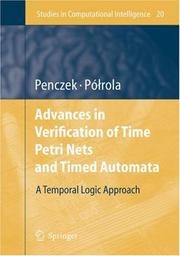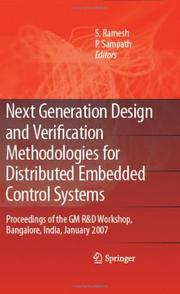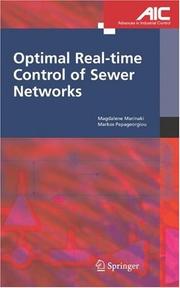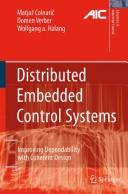| Listing 1 - 10 of 15 | << page >> |
Sort by
|
Book
Year: 2021 Publisher: Berlin ; Boston : De Gruyter,
Abstract | Keywords | Export | Availability | Bookmark
 Loading...
Loading...Choose an application
- Reference Manager
- EndNote
- RefWorks (Direct export to RefWorks)
"An increasing complexity of models used to predict real-world systems leads to the need for algorithms to replace complex models with far simpler ones, while preserving the accuracy of the predictions. This two-volume handbook covers methods as well as applications. This first volume focuses on real-time control theory, data assimilation, real-time visualization, high-dimensional state spaces and interaction of different reduction techniques. "-- Provided by publisher.

ISBN: 9783540328698 3540328696 9786610805150 1280805153 354032870X Year: 2006 Publisher: Berlin ; Heidelberg ; New York : Springer,
Abstract | Keywords | Export | Availability | Bookmark
 Loading...
Loading...Choose an application
- Reference Manager
- EndNote
- RefWorks (Direct export to RefWorks)
This monograph presents a comprehensive introduction to timed automata (TA) and time Petri nets (TPNs) which belong to the most widely used models of real-time systems. Some of the existing methods of translating time Petri nets to timed automata are presented, with a focus on the translations that correspond to the semantics of time Petri nets, associating clocks with various components of the nets. "Advances in Verification of Time Petri Nets and Timed Automata – A Temporal Logic Approach" introduces timed and untimed temporal specification languages and gives model abstraction methods based on state class approaches for TPNs and on partition refinement for TA. Moreover, the monograph presents a recent progress in the development of two model checking methods, based on either exploiting abstract state spaces or on application of SAT-based symbolic techniques. The book addresses research scientists as well as graduate and PhD students in computer science, logics, and engineering of real time systems.
Petri nets. --- Real-time control. --- Real-time data processing. --- Réseaux de Pétri --- Commande en temps réel --- Temps réel --- Electronic books. -- local. --- Petri nets --- Real-time control --- Real-time data processing --- Engineering & Applied Sciences --- Civil & Environmental Engineering --- Mathematics --- Physical Sciences & Mathematics --- Algebra --- Applied Mathematics --- Civil Engineering --- Fast-response data processing --- High-speed data processing --- Real-time computer control --- Engineering. --- Artificial intelligence. --- Mathematics. --- Applied mathematics. --- Engineering mathematics. --- Engineering, general. --- Mathematics, general. --- Appl.Mathematics/Computational Methods of Engineering. --- Artificial Intelligence (incl. Robotics). --- Electronic data processing --- Automatic control --- Graph theory --- Nets (Mathematics) --- Mathematical and Computational Engineering. --- Artificial Intelligence. --- Engineering --- Engineering analysis --- Mathematical analysis --- Math --- Science --- AI (Artificial intelligence) --- Artificial thinking --- Electronic brains --- Intellectronics --- Intelligence, Artificial --- Intelligent machines --- Machine intelligence --- Thinking, Artificial --- Bionics --- Cognitive science --- Digital computer simulation --- Logic machines --- Machine theory --- Self-organizing systems --- Simulation methods --- Fifth generation computers --- Neural computers --- Construction --- Industrial arts --- Technology
Book
ISBN: 1848821743 1849968241 9786611927462 1281927465 1848821751 Year: 2009 Publisher: New York : Springer,
Abstract | Keywords | Export | Availability | Bookmark
 Loading...
Loading...Choose an application
- Reference Manager
- EndNote
- RefWorks (Direct export to RefWorks)
Iterative learning control (ILC) has been a major control design methodology for twenty years; numerous algorithms have been developed to solve real-time control problems, from MEMS to batch reactors, characterised by repetitive control operations. Real-time Iterative Learning Control demonstrates how the latest advances in ILC can be applied to a number of plants widely encountered in practice. The authors provide a hitherto lacking systematic introduction to real-time ILC design and source of illustrative case studies for ILC problem solving; the fundamental concepts, schematics, configurations and generic guidelines for ILC design and implementation are enhanced by a well-selected group of representative, simple and easy-to-learn example applications. Key issues in ILC design and implementation in the linear and nonlinear plants that pervade mechatronics and batch processes are addressed. In particular, the book discusses: • ILC design in the continuous- and discrete-time domains; • design in the frequency and time domains; • design with problem-specific performance objectives including robustness and optimality; • design by means of classical tools based on Bode plots and state space; and • iterative-learning-based parametric identification. Real-time Iterative Learning Control will interest control engineers looking for examples of how this important control technique can be applied to a variety of real-life problems. With its systematic formulation and analysis of different system properties and performance and its exposition of open problems, academics and graduate students working in control will find it a useful reference to the current status of ILC.
Intelligent control systems. --- Iterative methods (Mathematics). --- Real-time control. --- Intelligent control systems --- Real-time control --- Iterative methods (Mathematics) --- Mechanical Engineering - General --- Mechanical Engineering --- Engineering & Applied Sciences --- Numerical analysis. --- Robotics. --- Iteration (Mathematics) --- Engineering. --- Chemical engineering. --- Engineering design. --- Control engineering. --- Manufacturing industries. --- Machines. --- Tools. --- Electronics. --- Microelectronics. --- Control. --- Industrial Chemistry/Chemical Engineering. --- Manufacturing, Machines, Tools. --- Engineering Design. --- Electronics and Microelectronics, Instrumentation. --- Automation --- Machine theory --- Mathematical analysis --- Numerical analysis --- Manufactures. --- Control and Systems Theory. --- Manufacturing, Machines, Tools, Processes. --- Manufactured goods --- Manufactured products --- Products --- Products, Manufactured --- Commercial products --- Manufacturing industries --- Chemistry, Industrial --- Engineering, Chemical --- Industrial chemistry --- Engineering --- Chemistry, Technical --- Metallurgy --- Electrical engineering --- Physical sciences --- Design, Engineering --- Industrial design --- Strains and stresses --- Design --- Microminiature electronic equipment --- Microminiaturization (Electronics) --- Electronics --- Microtechnology --- Semiconductors --- Miniature electronic equipment --- Control engineering --- Control equipment --- Control theory --- Engineering instruments --- Programmable controllers
Book
Year: 2021 Publisher: Basel, Switzerland MDPI - Multidisciplinary Digital Publishing Institute
Abstract | Keywords | Export | Availability | Bookmark
 Loading...
Loading...Choose an application
- Reference Manager
- EndNote
- RefWorks (Direct export to RefWorks)
Energy management systems (EMSs) are nowadays considered one of the most relevant technical solutions for enhancing the efficiency, reliability, and economy of smart micro/nanogrids, both in terrestrial and vehicular applications. For this reason, the recent technical literature includes numerous technical contributions on EMSs for residential/commercial/vehicular micro/nanogrids that encompass renewable generators and battery storage systems (BSS) The volume “Energy Management Systems for Optimal Operation of Electrical Micro/Nanogrids”, was released as a Special Issue of the journal Energies, published by MDPI, with the aim of expanding the knowledge on EMSs for the optimal operation of electrical micro/nanogrids by presenting topical and high-quality research papers that address open issues in the identified technical field. The volume is a collection of seven research papers authored by research teams from several countries, where different hot topics are accurately explored. The reader will have the possibility to benefit from original scientific results concerning, in particular, the following key topics: distribution systems; smart home/building; battery energy storage; demand uncertainty; energy forecasting; model predictive control; real-time control, microgrid planning; and electrical vehicles.
distribution systems --- smart home --- battery energy storage --- energy forecasting --- model predictive control --- real-time control --- microgrid --- black-start --- islanding --- master–slave control approach --- cold load pickup --- demand–response --- distributed electronic power converters --- optimal power sharing --- power flow control --- real-time simulations --- energy management system --- forecasting error --- rolling horizon --- demand uncertainty --- microgrids --- battery impedance model --- equivalent circuit model --- fractional-order model --- time- domain implementation --- efficient management --- energy resources --- heuristic approach --- nanogrid --- smart buildings --- micro-grid planning --- electrical vehicles --- energy storage --- flexible programming

ISBN: 128104542X 9786611045425 1402062540 1402062532 9048175836 Year: 2007 Publisher: [New York ] : Springer,
Abstract | Keywords | Export | Availability | Bookmark
 Loading...
Loading...Choose an application
- Reference Manager
- EndNote
- RefWorks (Direct export to RefWorks)
This volume is the proceedings of the workshop “Next Generation Design and Verification Methodologies for Distributed Embedded Control Systems” organised by General Motors R&D, India Science Lab. The workshop was held on January 5-6 2007 at the NIAS auditorium, IISc campus, Bangalore, India. This workshop is the first of its kind to be organised by an automotive major to bring together the leaders in the field of embedded systems development to present state-of-the-art work, and to discuss future strategies for addressing the increasing complexity of embedded control systems. The workshop consisted of invited talks given by leading experts and researchers from academic and industrial organizations. The workshop covered all areas of embedded systems development and in particular: Formal specification and verification of distributed, heterogeneous, embedded systems Formal semantics of modeling languages Model-based specification and testing Formal approach to component based development Software product line engineering Automatic code generation for distributed, embedded systems.
Automatic control --- Embedded computer systems --- Real-time control --- Systems engineering. --- Information theory. --- Software engineering. --- Computer simulation. --- Computer science. --- Circuits and Systems. --- Theory of Computation. --- Software Engineering. --- Simulation and Modeling. --- Math Applications in Computer Science. --- Informatics --- Science --- Computer modeling --- Computer models --- Modeling, Computer --- Models, Computer --- Simulation, Computer --- Electromechanical analogies --- Mathematical models --- Simulation methods --- Model-integrated computing --- Computer software engineering --- Engineering --- Communication theory --- Communication --- Cybernetics --- Engineering systems --- System engineering --- Industrial engineering --- System analysis --- Design and construction --- Electronic circuits. --- Computers. --- Computer science—Mathematics. --- Automatic computers --- Automatic data processors --- Computer hardware --- Computing machines (Computers) --- Electronic brains --- Electronic calculating-machines --- Electronic computers --- Hardware, Computer --- Computer systems --- Machine theory --- Calculators --- Cyberspace --- Electron-tube circuits --- Electric circuits --- Electron tubes --- Electronics
Book
Year: 2019 Publisher: MDPI - Multidisciplinary Digital Publishing Institute
Abstract | Keywords | Export | Availability | Bookmark
 Loading...
Loading...Choose an application
- Reference Manager
- EndNote
- RefWorks (Direct export to RefWorks)
The Special Issue on Advances in Water Distribution Networks (WDNs) explores four important topics of research in the framework of WDNs, namely simulation and optimization modelling, topology and partitioning, water quality, and service effectiveness. With regard to the first topic, the following aspects are addressed: pressure-driven formulations, algorithms for the optimal location of control valves to minimize leakage, the benefits of water discharge prediction for the remote real time control of valves, and transients generated by pumps operating as turbines. In the context of the second topic, a topological taxonomy of WDNs is presented, and partitioning methods for the creation of district metered areas are compared. In relation to the third topic, the vulnerability to trihalomethane is assessed, and a statistical optimization model to minimize heavy metal releases is presented. Finally, the fourth topic focusses on the estimation of non-revenue water, including leakage and unauthorized consumption, and on the assessment of service under intermittent supply conditions.
water distribution system --- artificial neural network --- 24 --- non-revenue water --- runaway conditions --- water quality (WQ) --- release of heavy metals (HMR) --- water service quality --- district metered areas --- modularity --- water distribution network --- optimization --- multiple source waters blending optimization (MSWBO) --- disinfection by-products --- multiple regression analysis --- snapshot simulation --- blending --- pump --- graph partitioning --- dual response surface optimization (DRSO) --- pressure-driven --- topological analysis --- pressure --- unsteady flow --- vulnerability --- water quality --- water distribution modelling --- real time control --- mathematical model --- water distribution network management --- energy recovery systems --- valve --- water hammer --- intermittent water supply --- leakage --- complex network theory

ISBN: 1280313161 9786610313167 1846280923 1852338946 1447156730 Year: 2005 Publisher: London ; [New York] : Springer,
Abstract | Keywords | Export | Availability | Bookmark
 Loading...
Loading...Choose an application
- Reference Manager
- EndNote
- RefWorks (Direct export to RefWorks)
Recent years have seen a very marked increase in the desire to protect the environment from any and all malign influences. The maintenance or restoration of water quality is a vital part of that protection. A sine qua non of control system development for modern sewer networks is therefore the preservation of the water system around a network’s outflow(s). Several approaches have been proposed for the optimisation of sewage control and Optimal Real-time Control of Sewer Networks provides a comparative synthesis of a central sewer network flow control based on two of these: nonlinear-optimal and multivariable-feedback control. In nonlinear optimal control, control and operational objectives are treated directly by the formulation of a nonlinear cost function minimized according to system constraints and the relevant state equation. The comparison presented uses the rolling horizon method for the real-time application of the optimal control algorithm with updated inflow predictions and updated initial conditions. On the other hand, the linear multivariable feedback regulator – considered with and without feedforward terms to account for external inflows – is developed via a systematic linear-quadratic procedure including precise specifications on model structure, equations and the choice of nominal steady state and quadratic criterion. The comprehensive testing and comparison of these protocols is undertaken on the basis of their respective control results for the real large-scale sewer network located around the river Obere Iller in Bavaria. The control strategies now implemented within this network are based on this study. Starting at the selection of possible methods of control and moving to the actual implementation of those methods in a real sewer system, Optimal Real-time Control of Sewer Networks will be invaluable to control and civil engineers working in sewage flow and wastewater treatment and of great interest to academics wishing to see how their ideas on optimal control are likely to work out when practically applied. Advances in Industrial Control aims to report and encourage the transfer of technology in control engineering. The rapid development of control technology has an impact on all areas of the control discipline. The series offers an opportunity for researchers to present an extended exposition of new work in all aspects of industrial control.
Combined sewers --- Real-time control. --- Automatic control. --- Real-time computer control --- Automatic control --- Sewerage --- Environmental pollution. --- Waste disposal. --- Civil engineering. --- Control and Systems Theory. --- Water Industry/Water Technologies. --- Waste Water Technology / Water Pollution Control / Water Management / Aquatic Pollution. --- Waste Management/Waste Technology. --- Civil Engineering. --- Engineering --- Public works --- Chemical pollution --- Chemicals --- Contamination of environment --- Environmental pollution --- Pollution --- Contamination (Technology) --- Asbestos abatement --- Bioremediation --- Environmental engineering --- Environmental quality --- Factory and trade waste --- Hazardous waste site remediation --- Hazardous wastes --- In situ remediation --- Lead abatement --- Pollutants --- Refuse and refuse disposal --- Environmental aspects --- Control engineering. --- Water-supply. --- Water pollution. --- Waste management. --- Aquatic pollution --- Fresh water --- Fresh water pollution --- Freshwater pollution --- Inland water pollution --- Lake pollution --- Lakes --- Reservoirs --- River pollution --- Rivers --- Stream pollution --- Water contamination --- Water pollutants --- Water pollution --- Waste disposal in rivers, lakes, etc. --- Availability, Water --- Water availability --- Water resources --- Natural resources --- Public utilities --- Water resources development --- Water utilities --- Control engineering --- Control equipment --- Control theory --- Engineering instruments --- Automation --- Programmable controllers

ISBN: 1281134236 9786611134235 1848000529 1848000510 1849967156 Year: 2008 Publisher: London : Springer,
Abstract | Keywords | Export | Availability | Bookmark
 Loading...
Loading...Choose an application
- Reference Manager
- EndNote
- RefWorks (Direct export to RefWorks)
Very often, practical design of embedded systems lacks consistency resulting in computer control systems that do not provide the performance they should. Most notably they lack dependability, a key property now that programmed electronic devices are so pervasive, even in extremely safety-critical applications. Distributed Embedded Control Systems handles the domains encountered when designing a distributed embedded computer control system as an integrated whole. First to be discussed are some basic issues about real-time systems and their properties, specifically safety. Then, system and hardware architectures are dealt with: areas like scheduling, asymmetrical distributed multiprocessor architectures, time-triggered communications, middleware, fault-tolerant peripherals, etc. Next, programming issues, embodying desired properties, basic language subsets, object orientation and language support for hardware and software specifications and co-design are elaborated and finally, the prototype implementation of a distributed embedded control system is given as a detailed example. Different audiences will find much of interest in this work: industrial professionals are given guidelines for the design of embedded hardware and software with fault tolerance that will help them to decide which methods, tools and solutions they should employ and to which features they should pay attention. Academics have a new source of solutions and further questions to stimulate research and it will also be informative for graduate students in electrical, control and computer engineering.
Automatic control. --- Embedded computer systems. --- Real-time control. --- Real-time computer control --- Automatic control --- Embedded systems (Computer systems) --- Computer systems --- Architecture Analysis and Design Language --- Control engineering --- Control equipment --- Control theory --- Engineering instruments --- Automation --- Programmable controllers --- Computer network architectures. --- Telecommunication. --- Microprogramming. --- Engineering design. --- Computer science. --- Control and Systems Theory. --- Computer Systems Organization and Communication Networks. --- Communications Engineering, Networks. --- Control Structures and Microprogramming. --- Engineering Design. --- Programming Languages, Compilers, Interpreters. --- Informatics --- Science --- Design, Engineering --- Engineering --- Industrial design --- Strains and stresses --- Computer programming --- Electric communication --- Mass communication --- Telecom --- Telecommunication industry --- Telecommunications --- Communication --- Information theory --- Telecommuting --- Architectures, Computer network --- Network architectures, Computer --- Computer architecture --- Design --- Control engineering. --- Computer organization. --- Electrical engineering. --- Microprogramming . --- Programming languages (Electronic computers). --- Computer languages --- Computer program languages --- Computer programming languages --- Machine language --- Electronic data processing --- Languages, Artificial --- Electric engineering --- Organization, Computer --- Electronic digital computers
Book
ISBN: 3540782559 3540782540 Year: 2008 Publisher: Berlin : Springer,
Abstract | Keywords | Export | Availability | Bookmark
 Loading...
Loading...Choose an application
- Reference Manager
- EndNote
- RefWorks (Direct export to RefWorks)
Recent evolutionary advances in information and communication technologies give rise to a new environment for Real Time Control Systems. This is a new dynamic environment that features both resource limitation and workload variability. As a consequence, the availability of the computing and/or communication resources becomes typically uncertain in modem Real Time Control Systems. In this context, the espQCtQd Quality of Control (QoC) of the systems cannot always be guaranteed by the traditional control systems design methodology that separates control from scheduling. From a resource scheduling perspective, the prevalent open loop scheduling schemes in real time systems obviously lack flexibility when applied to Real Time Control Systems operating in dynamic environments. To make the best use of available resources, more holistic principles and methods need to be developed. These requirements motivate the recent technological trend towards the convergence of computing, communication and control. This book is a monograph that covers our recent and original results in this direction. The main objectives of this work are: (1) To construct a unified framework of feedback scheduling that enables the integration of control with computing and communication. This framework will encompass a set of concrete feedback scheduling methods and algorithms that are applicable to different systems. With these methods and algorithms, solutions are provided for some key issues in feedback scheduling, thus promoting the emergence of this area. {2)To enable flexible QoC management in dynamic environments with uncertainty in resource availability.
Real-time control. --- Feedback control systems --- Adaptive control systems --- Computer scheduling --- System design. --- Quality control. --- Design, System --- Systems design --- Electronic data processing --- System analysis --- Processor scheduling (Electronic data processing) --- Scheduling of electronic data processing --- Production scheduling --- Time-sharing computer systems --- Self-adaptive control systems --- Artificial intelligence --- Self-organizing systems --- Feedback mechanisms --- Feedback systems --- Automatic control --- Automation --- Discrete-time systems --- Feedforward control systems --- Real-time computer control --- Scheduling --- Computer engineering. --- Telecommunication. --- Control and Systems Theory. --- Control, Robotics, Mechatronics. --- Electrical Engineering. --- Communications Engineering, Networks. --- Electric communication --- Mass communication --- Telecom --- Telecommunication industry --- Telecommunications --- Communication --- Information theory --- Telecommuting --- Computers --- Design and construction --- Control engineering. --- Robotics. --- Mechatronics. --- Electrical engineering. --- Mechanical engineering --- Microelectronics --- Microelectromechanical systems --- Machine theory --- Electric engineering --- Engineering --- Control engineering --- Control equipment --- Control theory --- Engineering instruments --- Programmable controllers
Book

Year: 2022 Publisher: Basel MDPI - Multidisciplinary Digital Publishing Institute
Abstract | Keywords | Export | Availability | Bookmark
 Loading...
Loading...Choose an application
- Reference Manager
- EndNote
- RefWorks (Direct export to RefWorks)
Connected and automated vehicles (CAVs) are a transformative technology that is expected to change and improve the safety and efficiency of mobility. As the main functional components of CAVs, advanced sensing technologies and control algorithms, which gather environmental information, process data, and control vehicle motion, are of great importance. The development of novel sensing technologies for CAVs has become a hotspot in recent years. Thanks to improved sensing technologies, CAVs are able to interpret sensory information to further detect obstacles, localize their positions, navigate themselves, and interact with other surrounding vehicles in the dynamic environment. Furthermore, leveraging computer vision and other sensing methods, in-cabin humans’ body activities, facial emotions, and even mental states can also be recognized. Therefore, the aim of this Special Issue has been to gather contributions that illustrate the interest in the sensing and control of CAVs.
TROOP --- truck platooning --- path planning --- kalman filter --- V2V communication --- string stability --- off-tracking --- articulated cargo trucks --- kabsch algorithm --- potential field --- sigmoid curve --- autonomous vehicles --- connected and autonomous vehicles --- artificial neural networks --- end-to-end learning --- multi-task learning --- urban vehicle platooning --- simulation --- attention --- executive control --- simulated driving --- task-cuing experiment --- electroencephalogram --- fronto-parietal network --- object vehicle estimation --- radar accuracy --- data-driven --- radar latency --- weighted interpolation --- autonomous vehicle --- urban platooning --- vehicle-to-vehicle communication --- in-vehicle network --- analytic hierarchy architecture --- traffic scenes --- object detection --- multi-scale channel attention --- attention feature fusion --- collision warning system --- ultra-wideband --- dead reckoning --- time to collision --- vehicle dynamic parameters --- Unscented Kalman Filter --- multiple-model --- electric vehicle --- unified chassis control --- unsprung mass --- autonomous driving --- trajectory tracking --- real-time control --- model predictive control --- tyre blow-out --- yaw stability --- roll stability --- vehicle dynamics model --- n/a
| Listing 1 - 10 of 15 | << page >> |
Sort by
|

 Search
Search Feedback
Feedback About UniCat
About UniCat  Help
Help News
News